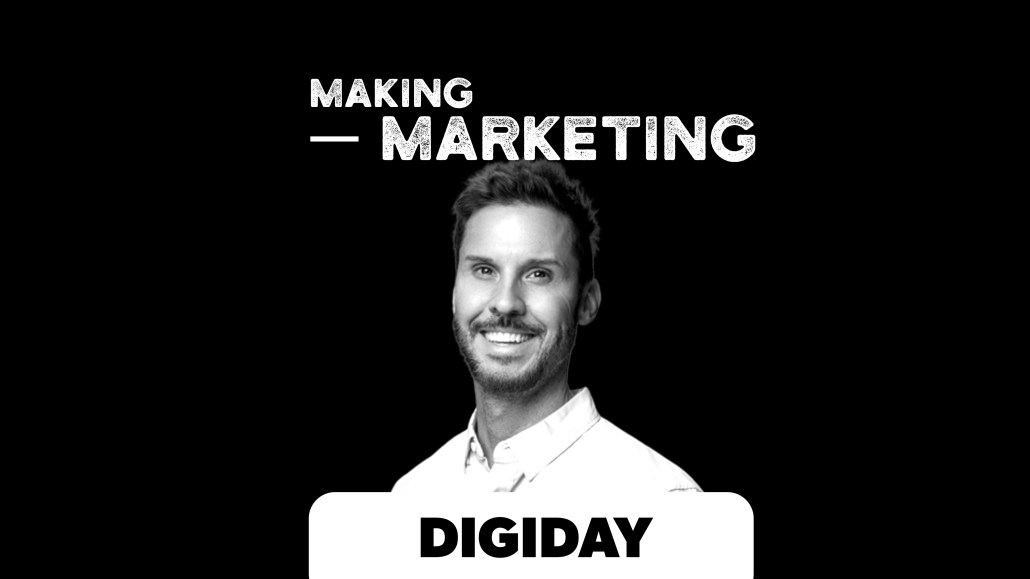Secure your place at the Digiday Publishing Summit in Vail, March 23-25

Subscribe: iTunes | Google Play | Stitcher | RSS | Anchor
Orangetheory, a fitness company founded in 2010, is now making $1 billion in revenue and is on track to open 2,500 studios by 2024. The brand is riding the wellness wave, which means more than just fitness. Kevin Keith, chief brand officer at Orangetheory, is focused on creating a strong brand message and differentiating.
“The idea of wellness is here to stay,” said Keith on Making Marketing. “The challenge is if everyone is talking about wellness and we are a wellness company, does that dilute our message? It’s important we stay in our lane. We don’t want to be all things to all people. A lot of fitness brands try to be the silver bullet or a lifestyle brand. We have the potential to be a powerful lifestyle brand but I will only say that when we have the potential of delivering that. We’re on the pathway to doing that. When you’re a lifestyle brand, you’re looking at something of value to offer 24 hours a day. Marketing and doing great ads and saying you’re a lifestyle brand is lazy marketing.
Keith revealed why being a lifestyle brand is not the goal, how wellness has permeated culture and whether a robot is going to take Kevin’s job. Edited highlights below:
The social influence has been effective in customer acquisition.
“Most of our member growth comes from existing members and 60 percent of our growth is from referrals. Our net promoter score is 80-83 percent. We have a huge social influence. We start the market story from our own members. In the age of digital, we are about human connection. You have to show up. The Facebook algorithm has changed. We grew out of word of mouth but also through Facebook retargeting for lead generation. That was fairly effective for us.”
AI has made data-driven customer acquisition more surgical and efficient.
“When we turned on the AI platform, it was incredibly inefficient at first, which is a part of the process. The cost of lead generation quadrupled but then it took a dive down into the single digits. It wasn’t about the cost per labor as much as the quality of the lead. We want data to predict what is a good lead, who is looking to take action. We want them to show up and try it. AI has helped us be more strategic in predicting the best lead of someone who is ready to take action. We have had AI [to buy media] going on for about a year-and-a-half now. The AI platform generates a more efficient buy across multiple platforms for us. We have been more surgical tactically. Our money is going further and allows us to cut a lot of waste.”
Content needs to be more personalized.
“Technology is helping in content marketing. You can serve relevant content to an individual. If you’re a 21-years-old female in Manhattan, we can serve you content that is reflective of their lifestyle. If you’re a 50-year-old man, I can show you Orangetheory is not just for women. It has benefits for men. We’re not diffusing the brand by telling you a thousand stories about Orangetheory, but we’re talking about how it gives you more life. And everyone’s idea of life is different. So the content is personalized for them.”
The role of the CMO is ever-expanding.
“We love our agencies and partners but we want to build an in-house team of content writers and a network outside of Orangetheory of content contributors. We want to provide content to show how to enjoy Orangetheory better. We need the agencies to be our truth serum. On the in-house agency side, I do think there are aspects we need to own. People turn to social media as a way of customer service now. That needs to be owned by us. It’s personal and we resolve issues. The job responsibility of the CMO is growing. Customer experience, marketing technology and tech management fall in the CMO’s court.”
More in Marketing

WTF is Meta’s Manus tool?
Meta added a new agentic AI tool to its Ads Manager in February. Buyers have been cautiously probing its potential use cases.

Agencies grapple with economics of a new marketing currency: the AI token
Token costs pose questions for under-pressure agency pricing models. Are they a line item, a cost center — or an opportunity?

From Boll & Branch to Bogg, brands battle a surge of AI-driven return fraud
Retailers say fraudsters are increasingly using AI tools to generate fake damage photos, receipts and documentation to claim refunds.





